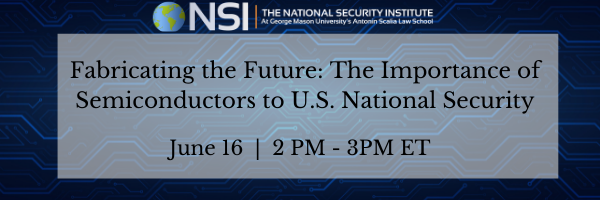
The National Security Institute was excited to host the next event in NSI’s Technology Innovation and American National Security Project, Fabricating the Future: The Importance of Semiconductors to U.S. National Security.
On Wednesday, June 16, from 2 – 3 PM ET, NSI hosted a panel featuring how the U.S. can build a robust and resilient supply chain featuring: Ritu Favre, Executive Vice President and General Manager of Semiconductor and Electronics at NI [National Instruments], John Neuffer, President and CEO of the Semiconductor Industry Association, and Sarah Stewart, Executive Director of the Silverado Policy Accelerator.
Semiconductors are the bedrock of nearly all modern industrial activities and the building blocks of advanced technologies; they are used in everything from cell phones and cars to military equipment and weapons. This past year, the demand for electronics soared, leaving the world in the midst of a global semiconductor shortage and illuminating supply chain security issues, including U.S. dependence on foreign foundries. Thanks for joining us for a timely and important discussion as experts weighed in on what the U.S. government and the private sector can do to address semiconductor supply chain insecurity.
This event featured:
 Ritu Favre is Executive Vice President and General Manager of Semiconductor and Electronics; Aerospace, Defense, and Government; and Transportation Business Units at NI. She’s responsible for driving growth and defining the systems, software, and services capabilities required to meet the unique needs of customers in these markets.
Ritu Favre is Executive Vice President and General Manager of Semiconductor and Electronics; Aerospace, Defense, and Government; and Transportation Business Units at NI. She’s responsible for driving growth and defining the systems, software, and services capabilities required to meet the unique needs of customers in these markets.
With more than 30 years of experience in tech, including multiple semiconductor industries, Ritu brings a diverse outside-in perspective to NI. A seasoned high-tech industry leader, she’s served as chief executive officer at NEXT Biometrics and on the Cohu Board of Directors. She’s also held senior management positions with market heavyweights like Motorola, Freescale Semiconductor, and Synaptics. When she’s not traveling as a self-proclaimed expert luggage packer, Ritu’s inspiring—and inspired by—the next generation of female leaders in the semiconductor industry as a member of the Global Semiconductor Association’s Women’s Leadership Council. She’s also an advisory board member to Microfacturing Institutes, a 501(c)3 charitable organization delivering high-tech education programs that increase diversity and broad participation in industry employment.
 John Neuffer is President and CEO of the Semiconductor Industry Association (SIA), which has been the voice of the chip industry for over four decades. He has been at the nexus of technology, public policy, and trade for most of his career. Since joining SIA in 2015, John has led the association’s policy advocacy in Washington and capitals around the world to foster growth and innovation in semiconductor design, manufacturing, and research. John also serves as a member of the Board of Directors of the Semiconductor Research Corporation, the world’s leading non-profit industry-government-academia microelectronics research consortium.
John Neuffer is President and CEO of the Semiconductor Industry Association (SIA), which has been the voice of the chip industry for over four decades. He has been at the nexus of technology, public policy, and trade for most of his career. Since joining SIA in 2015, John has led the association’s policy advocacy in Washington and capitals around the world to foster growth and innovation in semiconductor design, manufacturing, and research. John also serves as a member of the Board of Directors of the Semiconductor Research Corporation, the world’s leading non-profit industry-government-academia microelectronics research consortium.
Previously, John served for over seven years at the Office of United States Trade Representative (USTR) in Washington, DC: two years as Deputy Assistant U.S. Trade Representative for Asia-Pacific Economic Cooperation (APEC) Affairs, preceded by over five years as Deputy Assistant U.S. Trade Representative for Japan.

Sarah V. Stewart is the Executive Director of Silverado Policy Accelerator. Ms. Stewart has nearly two decades of experience as an international trade lawyer, policy expert, and negotiator. Immediately prior to joining Silverado, Ms. Stewart led the public policy efforts at Amazon on U.S. trade policy and export controls matters. From 2013 to 2018, Ms. Stewart worked for the Office of the United States Trade Representative, with her most recent position being the Deputy Assistant United States Trade Representative for Environment and Natural Resources. During her time at USTR, Ms. Stewart was the lead environment chapter negotiator for the US-Mexico-Canada Agreement and the Transatlantic Trade and Investment Partnership (TTIP) negotiations with the European Union.
